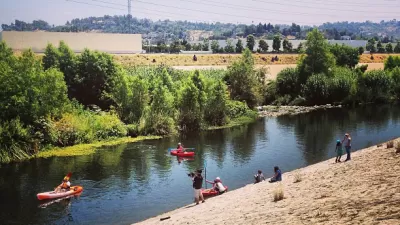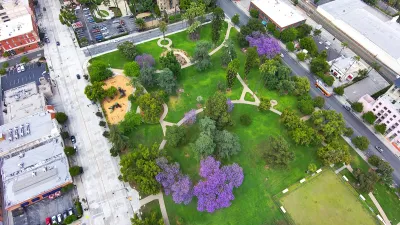Researchers have made a positive link between increased greenery in a child's neighborhoods and a reduction in aggressive behavior.

Researchers from the University of Southern California have identified the contribution that nature can play in reducing aggressive behavior in adolescents and teenagers. Reporting in Pacific Standard, Tom Jacobs writes that the study of over 1,200 children between the ages of 9 and 18, from 640 families in Los Angeles found that close proximity of green space to the children's homes resulted in less aggressive behavior.
“We found strong evidence supporting the benefits of neighborhood green space in reducing aggressive behaviors,” the researchers write. “The results of our adjusted analyses suggest a consistent pattern of decreased aggression associated with increasing residential green space within a 1000-meter buffer.”
They found no evidence this impact was limited to wealthier or poorer neighborhoods, and report it still held true after accounting for such factors as traffic density and proximity to freeways.
The study concludes that there is a clear benefit to mental health from interacting with natural environments, whether through providing access to areas for physical activity, reducing an area's ambient noise, or reducing pollution levels.
FULL STORY: Teenagers Surrounded by Green Are Less Aggressive

Alabama: Trump Terminates Settlements for Black Communities Harmed By Raw Sewage
Trump deemed the landmark civil rights agreement “illegal DEI and environmental justice policy.”

Study: Maui’s Plan to Convert Vacation Rentals to Long-Term Housing Could Cause Nearly $1 Billion Economic Loss
The plan would reduce visitor accommodation by 25% resulting in 1,900 jobs lost.

Planetizen Federal Action Tracker
A weekly monitor of how Trump’s orders and actions are impacting planners and planning in America.

Wind Energy on the Rise Despite Federal Policy Reversal
The Trump administration is revoking federal support for renewable energy, but demand for new projects continues unabated.

Passengers Flock to Caltrain After Electrification
The new electric trains are running faster and more reliably, leading to strong ridership growth on the Bay Area rail system.

Texas Churches Rally Behind ‘Yes in God’s Back Yard’ Legislation
Religious leaders want the state to reduce zoning regulations to streamline leasing church-owned land to housing developers.
Urban Design for Planners 1: Software Tools
This six-course series explores essential urban design concepts using open source software and equips planners with the tools they need to participate fully in the urban design process.
Planning for Universal Design
Learn the tools for implementing Universal Design in planning regulations.
Caltrans
Smith Gee Studio
Institute for Housing and Urban Development Studies (IHS)
City of Grandview
Harvard GSD Executive Education
Toledo-Lucas County Plan Commissions
Salt Lake City
NYU Wagner Graduate School of Public Service





























